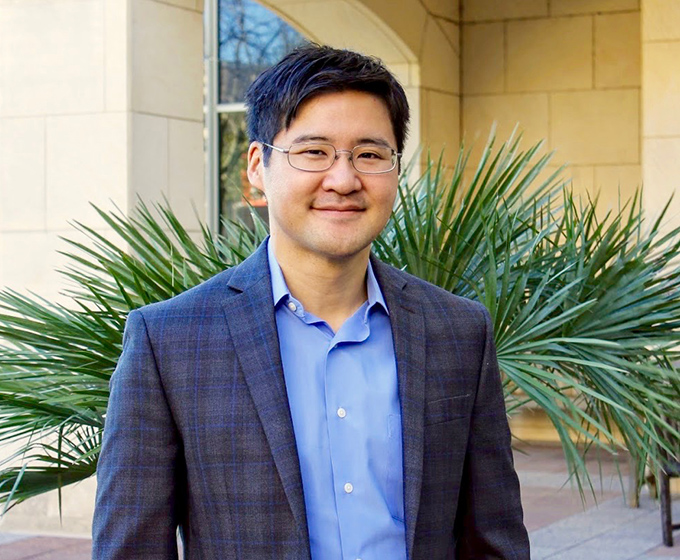(July 10, 2019) -- Almost four in 10 adult Americans are obese, according to the U.S. Centers for Disease Control and Prevention. What’s more alarming is that in the past two decades alone, in states such as Texas, the share of obesity among residents has tripled. If left unchecked, obesity can even lead to more serious problems including high blood pressure and deadly strokes.
To help mitigate rising obesity rates, UTSA has received funding to use a novel approach that inhibits the activity of a human protein that is thought to contribute to bad cholesterol.

UTSA chemistry professor Francis Yoshimoto has a patent pending to design a protein blocker against an enzyme that's associated with obesity.
Assistant Professor Francis Yoshimoto from the UTSA Department of Chemistry will design and test a protein blocker against the enzyme cytochrome P450 8B1 (P450 8B1). In previous research conducted by drug manufacturers, mice lacking the gene that expresses this protein have a lower risk of developing diabetes, heart disease, and stroke. They also resist weight gain.
“The scientific community has a hole in the knowledge,” said Yoshimoto. “We still have much more to learn about the functions of P450 proteins.”
Cytochrome P450 enzymes (P450s or CYPs) are found in all living things, including plants. Humans have 57 P450 enzymes. The activity of the P450 8B1 enzyme is associated with obesity.
In the past, Yoshimoto and his collaborators discovered how the P450 class of enzymes metabolize cholesterol, serve as catalysts to produce oxysterols (a class of hormones) and assist the human liver in processing drugs. However, when these enzymes become overactive, they can impair a cell’s metabolic processes. One particular P450 can even produce estrogen, which helps certain types of cancer grow.
Yoshimoto was inspired by previous studies at Merck. In those studies, transgenic mice lacking the gene encoding for P450 8B1 were used, and despite eating a high fat diet, they still maintained a lean weight.
The UTSA researcher then looked at the current cancer drug abiraterone, a derivative of progesterone that is used to shrink prostate cancer, and had a eureka moment.
Yoshimoto intends to use the same mechanism as abiraterone’s to shut down P450 8B1. He believes the introduction of a pyridine in the substrate backbone will inhibit the iron active site in P450 8B1.
He has a patent pending on his innovative approach.
“No one has worked on P450 8B1 in this way,” said Yoshimoto. “The beauty of the design is that it uses the same approach as a successful prostate cancer inhibitor.”
Yoshimoto’s medicinal chemistry research is made possible by the Max and Minnie Tomerlin Voelcker Fund, which is contributing $450,000 to support the work. The Voelcker Fund supports promising medical research that has the potential to have a significant impact on patient care.
“The end goal is to make a drug that fights obesity,” said Yoshimoto.
This project is an example of UTSA’s commitment to solving society’s most pressing global health challenges.
Learn more about the UTSA Department of Chemistry.
Explore the UTSA College of Sciences.
Celebrate UTSA’s 50th Anniversary and share social media posts about the 50th using the hashtag #UTSA50.
Connect with UTSA online at Facebook, Twitter, YouTube, Instagram and LinkedIn.
UTSA Today is produced by University Communications and Marketing, the official news source of The University of Texas at San Antonio. Send your feedback to news@utsa.edu. Keep up-to-date on UTSA news by visiting UTSA Today. Connect with UTSA online at Facebook, Twitter, Youtube and Instagram.
Annual Giving will host a First Day of School celebration to welcome students back to campus. We will have giveaways and photo opportunities.
Sombrilla Plaza, Main CampusEnjoy snacks while connecting with Adobe reps and student ambassadors. Download or log into the Adobe Express app to snag swag and unlock exclusive back-to-school templates. It’s a fun, fast way to get creative and start the school year with bold moves.
Central Plaza, Main CampusCelebrate the merger of UTSA and UT Health San Antonio with a pop-up featuring free t-shirts, exclusive swag, and interactive photo opportunities. Open to all students, faculty and staff. Supplies are limited!
Sombrilla Plaza, Main CampusHuddle Against Hunger is a fundraising competition with Texas State that benefits our Roadrunner Pantry. Donations this week will help UTSA earn additional prize monies provided by RBFCU.
In-Person and VirtualJoin UTSA Libraries for an update on federal public access policies and how the library can assist with compliance.
Virtual EventWe invite you to join us for Birds Up! Downtown, an exciting welcome back event designed to connect students with the different departments at the Downtown Campus. Students will have the opportunity to learn about some of the departments on campus, gain access to different resources, and collect some giveaways!
Bill Miller PlazaThere are many citation managers. Which one is right for you? This workshop will explain what a citation manager is and how it can help you organize your citations, insert citations as you write your paper, and generate your bibliography.
Virtual EventThe University of Texas at San Antonio is dedicated to the advancement of knowledge through research and discovery, teaching and learning, community engagement and public service. As an institution of access and excellence, UTSA embraces multicultural traditions and serves as a center for intellectual and creative resources as well as a catalyst for socioeconomic development and the commercialization of intellectual property - for Texas, the nation and the world.
To be a premier public research university, providing access to educational excellence and preparing citizen leaders for the global environment.
We encourage an environment of dialogue and discovery, where integrity, excellence, respect, collaboration and innovation are fostered.